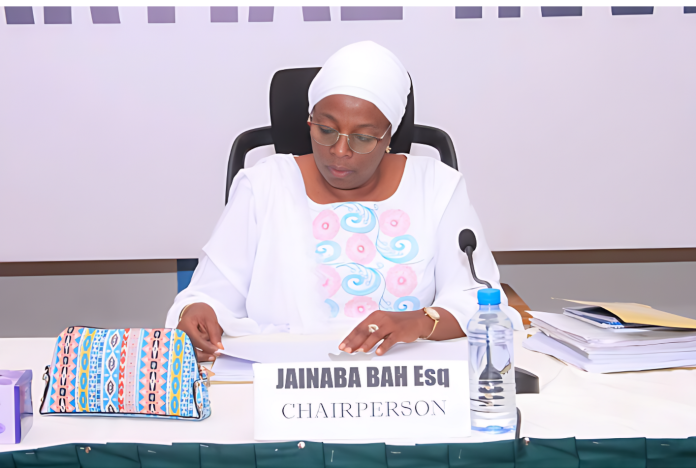A former senior official of the Banjul City Council gave testimony regarding dysfunction, financial mismanagement, and favoritism at the Council—placing particular emphasis on the city’s fuel expenditure, which he said routinely surpassed budgetary allocations.
Testifying before the Local Government Commission of Inquiry, the former Director of Finance, Camara, detailed what he described as administrative interference, citing personal efforts to implement reform that were routinely undermined.
Camara, questioned by Lead Counsel Patrick Gomez, said the Council’s fuel consumption habits had long deviated from the financial plan. “So it means you are spending far more than what you have budgeted for when it comes to fuel?” Gomez asked. “Yes,” Camara replied.
In 2021 alone, the procurement of fuel for dumpsite management operations cost BCC over 4.2 million dalasi. The mayor, he testified, consumed between 720,000 and 780,000 dalasi in fuel annually—exclusive of treks—while the entire fuel budget for the year was 6 million dalasi. With that figure, Camara noted, the fuel consumed by the mayor and the dumpsite operation alone would exhaust nearly the entire allocation, leaving other officials, including the CEO and finance director, without adequate provisions.
Camara said he received 3,000 dalasi worth of fuel weekly, while the Mayor received 15,000 and the former CEO, Mustapha Batchilly, 4,000. He noted that fuel coupons were only available when the Council’s accounts were in credit; otherwise, they resorted to cash-based “pay as you go” requests. “My experience is that when our accounts are good, we get the coupons,” he said. “Once the accounts go into negative, we don’t.”
The Council’s 2021 budget projected 107 million dalasi in revenue, of which 40 percent—about 42 million—was allocated to recurrent expenditure. However, Camara said the Council operated multiple accounts instead of one consolidated revenue account as required by law, complicating accountability. He conceded this was “contrary to the law.”
The witness admitted that his office did not conduct monthly bank reconciliations due to “capacity issues,” stating that he inherited a broken system lacking proper financial records. “We have done all the queries that we inherited and we solved some and some are work in progress,” he said.
Camara said his authority as finance director was consistently suppressed. “I don’t have powers working in BCC,” he told the Commission. He recounted how he was once arrested by 11 police officers and later expelled from certain projects for defending “what was right.”
While fuel took center stage, Camara also painted a broader picture of administrative dysfunction, including irregularities in staff leave approvals and contract procurement. He said he had requested two core revenue collectors—tasked primarily with trade license collections—to provide a detailed report before going on leave. The staff circumvented his directive by appealing directly to the Mayor’s office, where they received leave approvals within a day.
“This is what I mean when I say we cannot be singing two songs,” he said, referencing the lack of administrative cohesion.
In another episode, Camara said he deployed an economics intern from the University of The Gambia to the market to support mapping work but later found the intern reassigned to the internal audit unit. He said he later learned she was a neighbor of the Mayor in Kotu.
Camara submitted several documents into evidence, including the contract of Bakawsu Kanyi—allegedly a relative of the Mayor—who was hired to work at the dumpsite. He also submitted a court judgment in favor of 28 Council staff who were wrongfully terminated by the CEO, with BCC still struggling to fulfill the financial obligations arising from the case.
One of the more contentious issues was a contract awarded to Fatima Trading for the supply of 5,700 dustbins for 11 million dalasi. Camara said that despite the contract being duly signed, efforts were made by the Mayor and then-CEO Batchilly to annul the agreement in favor of Kebba and Sons, a company that had previously received a contract to supply 3,000 dustbins at a higher cost of 13.8 million dalasi.
“They did everything tooth and nail to break this contract,” Camara said. Fatima Trading, led by Fatima Sabally, resisted and presented legal threats backed by documentation, including the bill of lading, showing that the goods were already en route. Camara said this forced the Council to abandon their plan. “Why did they want to give it to Kebba and Sons?” Gomez asked. Camara replied that the Mayor was once a housemate of individuals linked to the company.
“If they are comfortable with you, they work with you,” he said of the Mayor and Batchilly, whom he accused of preferential treatment in procurement decisions. He claimed Kebba and Sons received numerous contracts based on personal rapport rather than merit.
Camara also raised concerns over the Council’s handling of staff loans. He said there was no loan policy in place and that he had drafted one, approved by the chairman of the finance sub-committee, only to have it ignored. Loan decisions, he said, remained the exclusive domain of the CEO. “There was no policy to guide the issue of giving loans to the staff,” he said.
In total, Camara submitted financial statements for 2021 and 2022, internal memos, and official correspondence to support his testimony. He said he often wrote memos “just to document and remind” the leadership that their responsibilities were professional, not political. One such memo carried the subject line: “Revival of Collection of Rental Operational License.”
“I knew it’s going to fall on deaf ears,” he said. “But I needed to remind him that this is office work and not politics.”
Asked about the Mayor’s transport allowance, Camara said he was unaware of the specific figure but would check the payroll. Nonetheless, he praised the internal audit unit, describing them as a “team” that helped him validate payments before they were approved.
“We cannot reform BCC if we are not unified in our actions,” he said. “It feels like we are singing different songs.”




















